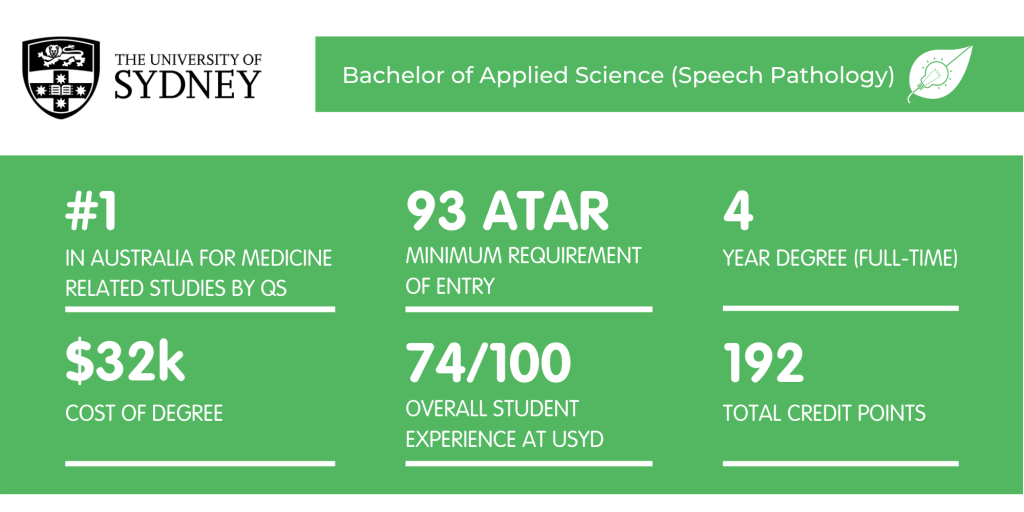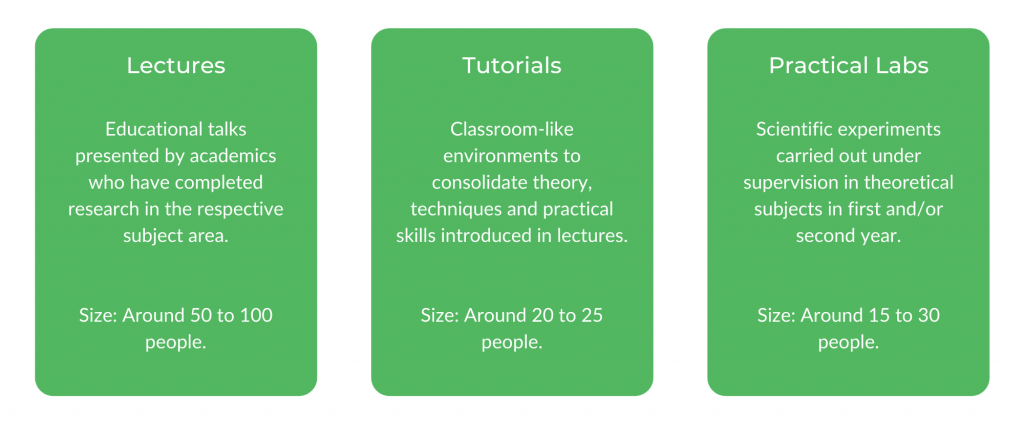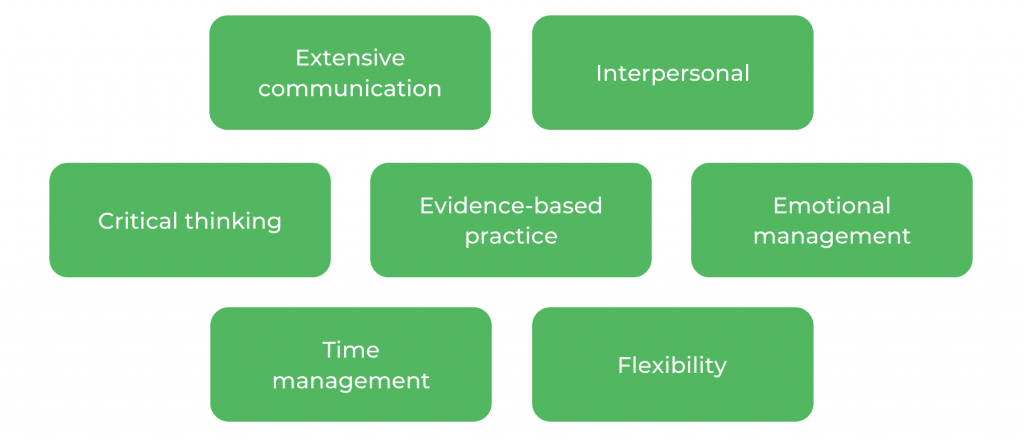
What’s all the talk about the Bachelor of Applied Science (Speech Pathology) at USYD?
Luckily for you, this article explores the key aspects of this degree, including its subjects, assessments, placements, peers and more.
Alright, enough chatting around — let’s get into it!
What is a Bachelor of Applied Science (Speech Pathology) at USYD?
Core Units for this Degree
How to Get into Speech Pathology at USYD
What’s the Teaching Format?
What’s the Faculty and Culture Like?
What is a Bachelor of Applied Science (Speech Pathology) at USYD?
USYD’s Bachelor of Applied Science (Speech Pathology) delivers a comprehensive set of scientific knowledge and practical experiences for students to become a professional speech pathologist, accredited under Speech Pathology Australia.
Within this degree, you’ll explore all areas of Speech disorders involving speaking, reading, writing, comprehension and more that persists in both children and adults.
Its theoretical aspect involves everything that’s got to do with speech therapy, such as speech science, neuroscience, behavioural management, linguistics and phonetics. Besides this, USYD also provides clinical placements from hospitals to schools to community health centres, so it’s quite a hands-on degree!

What is its Honours Program like?
What’s interesting about this degree is that it provides a chance to enrol for an “embedded Honours” for your final year, whereby some core units are swapped out for honours units. You will need to be invited by your unit coordinator based on your academic merit in order to apply for this honours pathway.
Doing an honours degree is great for students who want to have more experience in the research field! You will become busier than non-honours students though, as your research project is jam-packed alongside placements, so you tend to finish later than the other students.
Even so, it’s a great opportunity to contribute to the growing research of speech pathology and maybe even specialise further in your area of interest!
Who should study this degree?
This degree is perfect for anyone who loves to help people and enjoys integrating both theory and practical in their workspace. It’s quite a compressed degree, so it’s perfect for anyone who’s up for a challenge and is ready to work hard and time manage well.
It doesn’t end there — if you have a knack for critical thinking, this degree is sure to be a fun challenge for you as you learn how to diagnose, develop and deliver treatments for various cases of speaking disorders!
Career Paths
While the Bachelor of Applied Science (Speech Path) may seem very niche, it actually provides quite a few options as to where you want to work as a speech pathologist:
-
- Speech pathologist
- Paediatric clinics
- Hospitals
- Private practice
- Universities
- Rehabilitation centres
- Community health sectors
And more!
Core Units for this Degree
The Bachelor of Applied Science (Speech Path) at USYD does not have a lot of flexibility for its students. The Faculty has predetermined units for its students with 31 core units and 1 elective unit in its four year degree.
More details on the core units of study can be found here!
Overall, the core units encompass subjects that are relevant only to speech and hearing sciences.
Content Learnt through the Different Years of Study
First year starts off pretty broad to build the scientific fundamentals with an introduction into speech and hearing, along with an exploration into other relevant subjects such as neuroscience, biomedical science and health study.
In second year, you start to delve deeper into these areas with a particular focus on communication disorders involving neuroscience, child language, cognitive neuropsychology and motor speech dysphagia.
Third year is where things get more practical with subjects such as specialist studies, speech pathology research methods as well as counselling behaviour and management that is highly useful for your later professional practice.
Fourth year is highly hands-on as you will have more clinical placements alongside practical based units such as Evidence Based practice for SP and Professional Issues.
In your fourth year, you also get to choose an elective of the following:
-
- REHB2026: Fundamentals of Rehabilitation
- WRIT100: Introduction to Academic Writing
- BIOS1168: Functional Musculoskeletal Anatomy A
- BIOS1170: Body Systems: Structure and Function
For more details about how you can schedule your core units, check it out here!
How can you specialise?
Unless you are doing the embedded Honours program, you cannot specialise in any particular aspect of speech pathology in this degree. Most students graduate as general practitioners, though you are encouraged to get a feel of what you like during your placements.
To specialise, you can choose to do more coursework or research on your area of interest after your degree outside of university to develop more specific skills, knowledge or treatment.
What are the clinical placements like?
USYD’s Speech Pathology degree is full of clinical placements. The University organises these clinical placements wherever possible, including on-campus, off-campus; city and rural areas. These placement locations can include preschools, hospitals, private practices and even community health centres.
These placements are on a pass or fail basis! This might sound scary but don’t worry — USYD eases its students into the whole clinical placement process from the start.
Second Year
Placements begin in your second year and will most likely take place in a student clinic at USYD for one hour, once a week within the semester. A few hours of the semester will also be blocked off to help you prepare for placements too.
Here, you will be paired with a fourth-year mentor to help introduce you to paperwork such as patient reports, treatment assessments and more. You will start off observing their practice and slowly take over more responsibilities and tasks each week.
In your other semesters, you may find yourself working off-campus which will take around 3 to 4 days for 6 to 12 weeks depending on your supervisor. At times, you may work in an integrated team to help with the process of transitioning into the facilities’ workforce.
Third Year
Third year gets more intense with 3 blocks of placement where you can choose to start off with adult or paediatric units in the beginning of your semester. Fortunately, you will be paired with another 3rd year peer to work with a client together to assess, diagnose and treat them.
Fourth Year
Your fourth year is where you earn your independence! Here, your supervisor will monitor your one-on-one interactions with your clients. It is also the year with the most placements, as you will find that half the time you will be doing practical work alongside the theory!
Can you study overseas?
Yes! The 6 unit FHS Abroad program at USYD provides senior health students with the opportunity to study and complete a 4 to 6 week placement in a handful of South and South East Asian countries.
Check out the details here!
How to Get into Speech Pathology at USYD
The guaranteed ATAR required to enter this Speech Pathology degree at USYD is 93. This ATAR requirement may increase or decrease each year depending on the demand and availability of places.
What other pathways can I take?
If you don’t get into this degree straight after high school, don’t fret! After completing a Bachelor’s degree of your own choosing, you can always apply for the Master of Speech Language Pathology at USYD, which is a two year graduate program that essentially passes down the same skills as the Bachelors of Applied Science (Speech Path).
While you are free to complete any degree you like, it is recommended that you complete an undergraduate degree that encompasses relevant subjects such as linguistics, phonetics, anatomy and neurology of the speech systems to equip you for the Masters program!
Learn more about the Masters program here!
There are also other universities such as the UTS, though it’s a Master’s degree, not a Bachelor’s degree. Feel free to check it out here!
What are the prerequisite subjects?
Luckily for you, there are no prerequisite subjects that you need to be eligible for this degree! All you need to do is to complete your HSC with the required ATAR and you’re good to go.
What scholarships are available?
There are a handful of scholarships that USYD provides for Speech Pathology students. One of them is the Douglas and Lola Douglas Scholarship in Health Sciences (Speech Pathology) which you can check out here!
USYD also provides a large array of scholarships to help students achieve their best academic potential. Some that are targeted towards health students can be found here.
What’s the Teaching Format?
USYD’s Speech Pathology degree is carried out in two semesters per year. In each semester, 4 units are delivered through lectures, tutorials and practical labs.
Class Structure

Lectures
Lectures are attended by 50 to 100 people, where lecturers will go through the theoretics of speech pathology sciences. These lectures may go on for 1 or more hours, and the duration may vary each week.
Tutorials
Tutorials have around 20 to 25 people attending them, where you will do more hands on work. Your tutor will choose a specific aspect of speech pathology and help your practice it to perfection in these classroom-like environments.
For example, if your tutor chooses to work on augmentative communication, you will need to learn sign language to practice with your classmates. At times, you may even go through upcoming assignments with your peers to collaborate with them. The duration of these tutorials can vary each week.
Practical Labs
Practical labs are only carried out in first or second year in your introductory science subjects such as biology and anatomy.
Around 30 to 50 people attend a 3 to 4 hour practical lab session per unit per week, where you will carry out scientific experiments with a supervisor. As the science subjects become more speech specific in second year, there will be less practical lab sessions.
How much time do you spend on campus?
USYD’s Speech Path degree adds up to 16 hours of on campus class hours or more, requiring students to come to the Cumberland and/or Camperdown campus for 4 days a week. Remember, this excludes the clinical placements and independent learning that are alongside your on campus classes!
Altogether, this Speech Path degree requires 40.40 hours per week, making it one of the most intensive courses at USYD.
What are the assessments like?
USYD’s speech pathology assessments tend to be very theoretically based with essays, presentations, placement paperwork, final exams and the occasional quiz.
Essays
For essays, you will be required to do literary research on a specific topic that has been introduced in your lectures. This is to help form an evidence-based understanding of the practices and solutions you will be carrying out.
These tasks can get really creative too — for example, you may be asked to form a resource that may help the client communicate better. You may also be asked to present your findings as a presentation too!
Placement Paperwork
Placement paperwork such as client progress reports makes up most of your assessments! This paperwork instils a holistic, evidence based practice under the E3BP concept that secures your clinical reasoning behind the assessment, diagnosis and treatment plans for your clients.
Final Exams & Quizzes
Final exams are carried out to consolidate your theoretical understanding of the concepts learned in class. Sometimes, quizzes will be carried out before finals period in tutorials to help you prepare for the big thing!
Skills You Develop

USYD produces Speech Path graduates with strong, adaptable qualities who are ready to face any problem that life throws at them!
As a communication specialist, Speech Path students graduate with refined communication skills to work with a large range of speech and hearing disorders. With the many placement experiences, you will develop high interpersonal skills and emotional management to work with patients in different situations, including autism, palliative care and PTSD patients.
Through its rigorous theoretical roots, USYD Speech path graduates learn to embed a strong evidence-based foundation to their practices to ensure the effectiveness of their treatments. Even so, Speech Path students learn to be open-minded and flexible with their practices to improvise according to unique circumstances. As this degree is pretty full-on, students also learn to organise their time well.

What’s the Faculty and Culture Like?
USYD’s speech path cohort basically “grow up” together as you all share the same units throughout your degree! The faculty, although small, is also very inspiring and passionate about their research, so you feel very motivated to do well in your studies.
Culture
The Speech Path community at USYD is generally very tightly knitted, as all speech path students share the same core units. This means maintaining friendships are very easy as you see and work with each other very often in classes such as lectures, placements or group assignments. As the course can be very strenuous, speech path students are also very supportive of one another!
Although a female-dominated discipline, USYD’s Speech Path cohort consists of a vast array of cultural diversity too, providing new insights, skills and perspectives that may enlighten you!
Society
Speech Path students are lucky to have a society made for them. The USYD Student Association of Speech and Hearing (SASH) helps communication between the staff and its students while organizing many social events such as pizza parties, welcome BBQs and more!
Check out their Facebook page here!
Faculty
USYD’s Speech Path faculty is no joke when it comes to high class teaching. Almost all the lecturers you get are renowned pioneers in the field of speech path research — so it’s like you’re watching a celebrity present their findings right in front of you!
Alice Baker is one of the most inspirational lecturers of the team who has published textbooks and delivers talks on speech sound! These lecturers exude an extreme passion for their field, so you’ll definitely feel inspired and more motivated to do well in your studies.
The staff are also quite willing to help you if you are struggling with course content, so don’t feel afraid to ask questions after the lecture or during tutorials.
Mentorship Programs
If you are having trouble navigating the Speech Path degree, there are some mentorship programs to help you transition smoothly into university life!
BELONG is one of the speech path mentorship programs, where first years are allocated fourth year students who provide advice, guidance and answer questions for once a week for the first semester. Though, it is an external program outside of USYD and is student led.
USYD also provides a mentorship program where it is compulsory for speech path students in their final year to mentor second year students to help them ease into placement procedures and paperwork.
So don’t worry, you won’t feel alone transitioning into this degree!
Kate Lynn Law graduated in 2017 with an all rounders HSC award and an ATAR of 97.65. Passionate about mentoring, she enjoys working with high school students to improve their academic, work and life skills in preparation for the HSC and what comes next. An avid blogger, Kate had administered a creative writing page for over 2000 people since 2013, writing to an international audience since her early teenage years.


